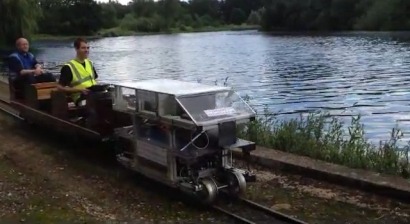
This narrow gauge locomotive is a hybrid design, combining a hydrogen fuel cell and lead acid batteries similar to the ones used in cars. The fuel cell is used both to power the permanent magnet electric motors and to charge the batteries, with the batteries helping to meet the peak power demands when accelerating under load.
Hydrogen provides a clean source of energy and it offers a considerable extension in range in comparison to battery only operation. Over 5,000 litres of hydrogen are stored in a solid state metal hydride tank at relatively low pressure, with the system typically operating at just 5 bar. This was achieved by using one of the ten advanced hydrogen storage units successfully employed on the University’s hydrogen powered canal boat, the Ross Barlow.
This amount of hydrogen would enable the locomotive to haul a 400 kg load up over 2,700 m – twice the height of Ben Nevis (the UK’s highest mountain) – and two additional tanks can be easily fitted to further extend its range.
The locomotive also features regenerative braking to capture, store and re-use braking energy, as well as adjustable air suspension and a highly advanced touchscreen remote control that operates over a Wi-Fi link.
The locomotive was tested at the Stapleford Miniature Railway in Leicestershire as part of a competition led by the Institute of Mechanical Engineering. “We are really pleased with the locomotive, particularly as it managed to haul 4000kg, well over six times the specified load,” comments Stephen Kent the project’s team leader.
“Our hydrogen powered locomotive is a clean and efficient example of how hydrogen power could work for future trains on non-electrified routes. We hope that our efforts will encourage the rail industry to take a closer look at this exciting technology,” adds Dr Stuart Hillmansen, from the University of Birmingham’s School of Electronic, Electrical and Computer Engineering, faculty advisor to the team.
This hydrogen power project was made possible through the Circles of Influence Innovation and Immediate Impact fund at the University of Birmingham. More than 150 extraordinary projects totalling more than £2 million have been financed through this fund since 2002.
For additional information:

